|

by Mirja Holtrop
27 October, 2016
from
Dr-Rath-Foundation Website

During the Middle Ages, knowledge about the healing properties of
plants mainly came from druids and witches.
These people knew about nature and
healing and could treat health problems such as inflammation or
small wounds with simple mixtures of leaves and herbs. But this
eventually made them a threat
to the Church.
Catholicism was very powerful and did not accept any solutions to
disease other than,
Even if there was no cure available for a disease during
a person's lifetime on Earth, a great life in 'heaven' was promised to
them afterwards.
So druids, witches, and their natural
remedies represented a threat to this model.
Labeled as evil, they were
brutally
eradicated.
Today's
illegal drugs were yesterday's legal ones
In the early 1900s cocaine and heroin were legal, everyday drugs.
...and both were prescribed as mood enhancers.
C.F. Boehringer from Mannheim, Germany, was proud to be the
world's leading cocaine producer. Even wines often contained
cocaine, and so were consequently in huge demand.
Pope Leo XIII
awarded a gold medal to winemaker Angelo Mariani for his invention
of
cocaine-enriched wine.
On the label of
Maltine wine, produced in
New York, people were instructed to consume a full glass during and
after meals, with children recommended to take a half glass full.
Metcalf was another famous
cocaine-wine that was popular as a party drink.
Vapor-OL
was a mix of alcohol and opium that was claimed to cure asthma and
spasms.
As wine bottles were too bulky to put in
handbags, ladies instead carried small cocaine tablets with them
when they went out. These were supposedly used to enhance mood and
treat the vocal cords.
For avoiding sore throats, such tablets
were seen as essential for singers, mothers with young children, and
teachers. Children were even given cocaine tablets for toothache. It
only cured the symptoms, of course, and the pain soon came back once
the effects of the drug wore off.
Even today, dentists use a modified form
of cocaine known as
Lidocaine to numb nerves before surgery.
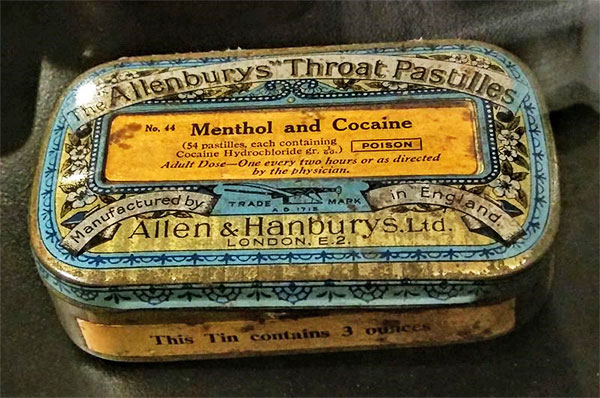
Maksym Kozlenko
(Own work)
via Wikimedia Commons
Another example is a drug known as
Paregoric, produced by Stickney
& Poor's, which contained 46% alcohol and a large percentage of pure
opium.
Unbelievably it was recommended as a
sleeping aid for newborns, who were to be given 3 drops daily. 8
drops daily were advised for 8 day old babies; 25 drops for
5-year-olds; and an entire tablespoon for adults.
No doubt everyone
slept well...
Today there are
museums in
Germany, such as in Dortmund and Heidelberg, where you can see
medicine bottles and jars from those bygone days. It is worth a
visit, they're very educational...!
The legal drugs of today
It would be wishful thinking to pretend
that dangerous drug-based medicines no longer exist. The nightmare
is still out there, every day.
We are confronted with it the minute we
get sick and go to our doctor seeking medical treatment.
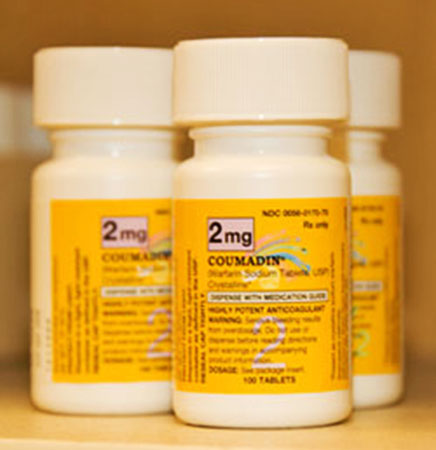
A pharmaceutical
product
containing Warfarin.
The chemical drugs prescribed by
conventional doctors cause multiple side effects.
While our body understands - and can
safely metabolize - natural molecules, the synthetic manmade
chemicals that doctors prescribe are foreign to it.
Take the example of
warfarin, an
anticoagulant (blood thinning) drug, which is prescribed for
millions of people suffering from cardiovascular disease. Also used
as rat poison, it is one of the leading causes of death in hospital
emergency rooms in the United States.
For those patients it doesn't kill, the
possible side effects of warfarin include,
-
foot ulcers
-
purple toes or fingers
-
dizziness
-
bloody stools
-
coughing up blood
-
bleeding that won't stop
-
nausea
-
vomiting
-
breathing difficulties
-
shortness of breath
-
paralysis,
...among others.
Many deaths from
hypovolemia, a
dangerous decrease in the volume of blood in the body, are linked to
the long-term use of blood thinning drugs.
Antibiotics - another
huge market
Have you ever thought about what the
word 'antibiotic' actually means? It means 'against life
(anti: against; biotic: life)'...
If you eat non-organic meat, you get a
dosage of chemical antibiotics each time you enjoy that fine piece
of beef or chicken wing. Make no mistake, antibiotics are toxic.
When patients develop the flu, many GPs
immediately prescribe them chemical antibiotics. These kill ALL
bacteria in the bowel - including the 'friendly' ones. Proper
digestion and absorption of micronutrients are then impossible for
days afterwards.
But there are other, safer, approaches.
Many natural antibiotics exist that are
based on plants and which won't harm the beneficial bacteria that
live in the bowel.
Natural plants
with antibiotic properties
-
Balsamodendron muskul
-
Maharasnadi quath
-
Tinospora cordifolia
-
Rubia cordifolia
-
Shank bhasma
-
Emblica officinalis
-
Sutherlandia frutescens
-
Moringa pterygosperma
-
Glycyrrhiza glabra
-
Asparagus racemoses
-
Cimmamonum zeylanicum
These natural antibiotics are very
powerful. But as they can't be patented they are of no interest to pharma companies because the
profit margin is too low.
A healthy body is no use to the drug
industry; only sick bodies generate profits.

Rubia
cordifolia
Vinayaraj
(Own work)
via Wikimedia Commons
Fluoride is toxic and
does not belong in toothpaste
Another extremely toxic substance is
fluoride,
which is an ingredient in most toothpastes.
Raymond Francis, an MIT-trained
scientist, has
described fluoride as one of the most toxic chemicals in our
environment and a vast experiment. Only a handful of toothpastes are
decent, the best ones contain natural substances such as tea-tree
oil and sea salt.
A waste product of the chemical
fertilizer industry, fluoride is also a main ingredient of
antidepressant drugs such as,
-
Diazepam
-
Flunitrazepam
-
Rohypnol
-
Stelazine
-
Trifluoperazin
-
Prozac
-
Zoloft
The easy accessibility of
antidepressants
Kim, 38, describes her
experience as follows:
"I
just had a baby and suffered from so called 'Baby Blues'.
I wasn't feeling
well, had mood swings, and could not easily fall asleep. I was
anxious and restless. I went to see my GP and he prescribed
Zoloft to 'take a bit of the edge off'.
I didn't think about
it and in the beginning it worked well, I felt less emotional
about things and could sleep better, but after some months I was
more depressed than ever before.
It was my birthday
when I got a gift and I could not even be happy about it, but
felt completely numb, when I realized I had to stop. It's months
ago that I took the last pill and even now I have not fully
returned to the old 'me'."
These days, even children and teenagers
are given antidepressants. Disturbingly, some 6-year-olds are now on
them and the number of young users is increasing.
Consider some of the possible
side-effects:
-
Depression
-
Mania and psychosis
-
Suicidal feelings
-
Violence
-
Cancer
-
Birth defects and increased risk
of autism
-
Brain damage
-
Weakened bones
-
Uncontrollable body movements
-
Increased risk of diabetes
-
Increased risk of strokes
-
Increased risk of dementia
-
Increased risk of nervousness,
insomnia, and restlessness
-
Apathy
-
Sexual problems
-
Addiction
For more information on the dangers of
antidepressants, visit the
ssristories.org Website.
To treat depression naturally,
recent research suggests that large amounts of the omega-3 fatty
acids DHA and EPA, together with a selection of micronutrients, may
be effective.
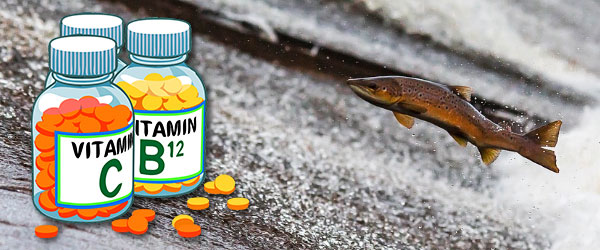
to antidepressants.
The enormous profits of
the business with disease
Shouldn't our governments have a moral
and legal duty to start funding scientific studies dealing with
natural health approaches? They should, but unfortunately financial
interests are preventing this from happening.
To illustrate
the pharma industry's
enormous profit margins from chemical drugs, let's take a couple of
examples:
Aspirin:
One packet
with 20 tablets = $3
Production costs, incl. packet = $0.03
Percentage markup = 10,000% !
Xanax:
100 x 1mg
tablets = $136.79
Production costs = $0.024
Percentage markup = 569,958% !!
As you might imagine, at the political
level, profits like this buy the pharma industry a lot of influence.
Who controls the world?
Large shareholdings in some of the
world's biggest corporations are owned by a web of globally
operating families.
In addition to the pharma industry,
these same families also control banks, chemical companies, biotech
companies, news agencies, and other key sectors of society.
"Let
us control the money of a country and we care not who makes its
laws."
The maxim of the
house
of Rothschilds, and the foundation principle of European banks, as
described in a report on official US government hearings in 1914.
In the area of banking, one of the most
influential families is
the Rothschild family.
Descended from Mayer Amschel
Rothschild, who established a banking business in the 1760s,
the UK's Daily Telegraph newspaper has
described them as a byword for wealth and power, observing that,
"the Rothschild name has become
synonymous with money and power to a degree that no other family
has ever quite matched."
Tellingly, it is said that the original
version of the hit song from the Fiddler on the Roof musical was not
If I Were a Rich Man, but If I Were a Rothschild...
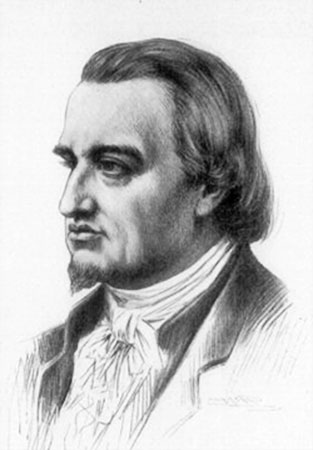
Mayer Amschel
Rothschild
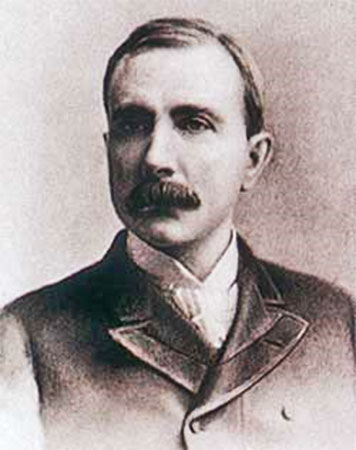
John D.
Rockefeller
So far as the development of the
pharma industry is concerned, arguably the most important influence
was an American named
John D. Rockefeller.
A
short history of his drive to create an industrialized health
care system can be read on our Foundation website.
There is also a revealing book
titled 'Rockefeller
Medicine Men' which describes how, in the early years of the
20th century, Rockefeller created the
pharmaceutical investment industry to further the already
massive wealth and power he had accumulated via his control of the
oil industry.
The key principles behind Rockefeller's
drug business plan, which form the
laws of the pharma industry today, were as follows:
-
The products must be patentable.
-
The products should not address
the root causes of disease, but only treat the symptoms.
-
The products should have
addictive potential.
In a vivid illustration of how key
families in the global investment business link up with each other,
in May 2012 it was
announced that the Rothschild banking dynasty had bought a 37
percent stake in the Rockefeller group's wealth and asset management
business.
The move brought together David
Rockefeller, then 96, and Jacob Rothschild, then 76 -
family patriarchs whose personal relationship is said to have
spanned five decades.
The pharma industry's
main goal is not cure, but profit

Drug companies aren't interested in
curing patients, their sole focus is on turning them into lifelong
customers.
This means that the marketplace for the pharma industry is the human body. With help from the food industry,
which produces
processed fast foods and
sugary soft drinks, the
transformation of health into sickness - upon which drug companies
financially thrive - can easily be achieved.
To ensure everything runs smoothly,
expensive advertising agencies are employed. The largest of these
are present in multiple countries and offer pharma companies direct
contact with government health officials.
They also provide free medical
'training' for doctors to promote new drugs to patients.
But it is not all bad news...
As
organic
and healthy lifestyles become more and more popular, people are
increasingly feeling the beauty of reconnecting with nature. New
approaches to education are teaching children to think for
themselves and make their own choices.
Natural therapies with micronutrients
and healing plants are increasingly available and are being used by
larger numbers of people.
Social media has played a major role in
this through people sharing their experiences online. The inevitable
result of all this is that, slowly but surely, the pharmaceutical
industry's power and influence is being reduced.
While we don't yet have large hospitals
and universities promoting natural remedies, one day we most surely
will.
|









